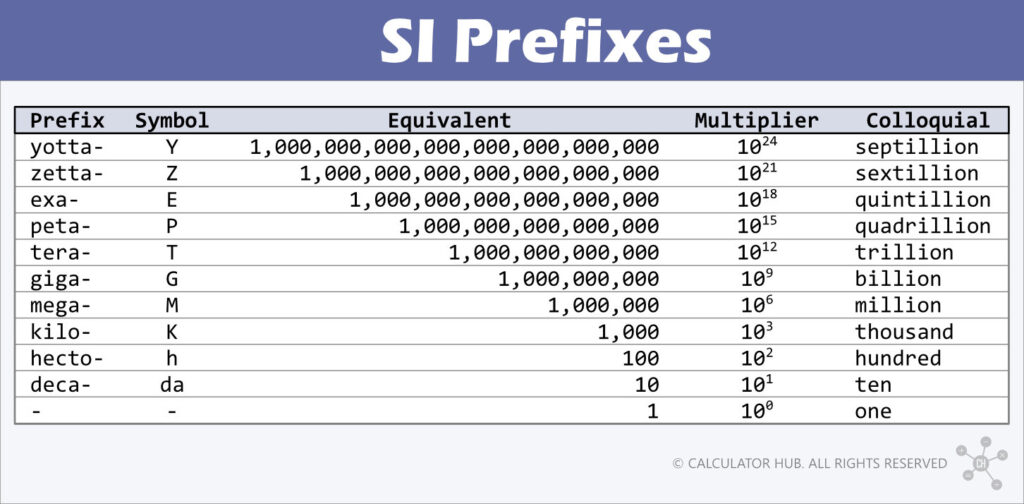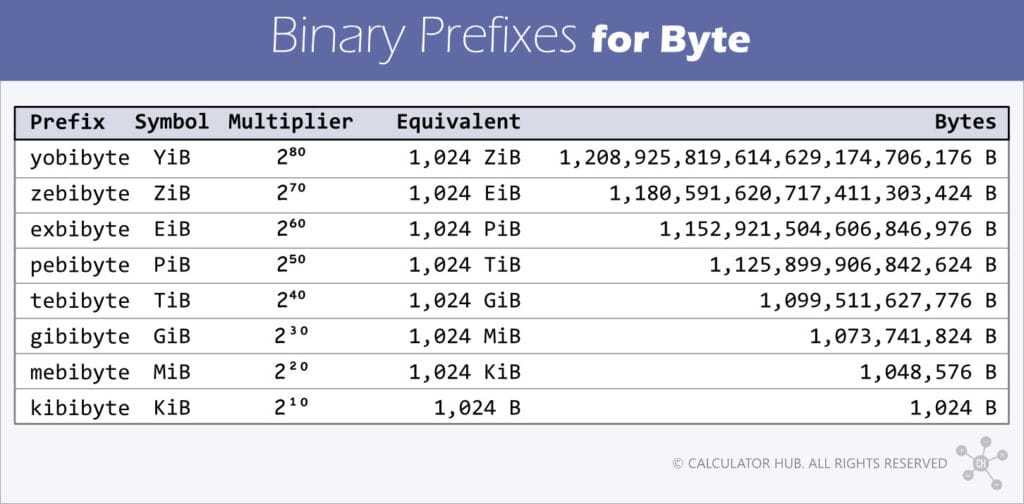This article will show how to convert data from gigabytes (GB) to megabytes (MB). We will cover essential definitions, provide examples, share relevant formulas, and present tables, along with answers to common questions.
Definitions of MB and GB
Let’s get started by understanding the key definitions and differences between Megabyte and Gigabyte. Understanding these terms will allow you to perform conversions confidently.
What is a Megabyte (MB)?
A megabyte (MB) is a unit of measurement for data storage used to measure files or memory that are large, typically between one million and one billion bytes.
It has symbols or abbreviations such as MB, Mbyte, MiB, or Mibyte.

When using International System of Units (SI) prefixes[1], which are based on powers of 10, a megabyte (MB) equals 1,000,000 bytes.
1 MB = 103 KB = 1,000 KB1 MB = 106 B = 1,000,000 B
When using International Electrotechnical Commission (IEC) binary prefixes[2], which are based on powers of 2, a megabyte (MB) equals 1,048,576 bytes.
1 MiB = 210 KiB = 1,024 KiB1 MiB = 220 B = 1,048,576 B
For general communication, you can use SI prefixes as they are familiar with the metric system, while for more accurate contexts, you should use IEC binary prefixes.
What is a Gigabyte (GB)?
A gigabyte (GB) is a unit of measurement for data storage used to measure device capacity, files, or memory that are large, typically between one billion and one trillion bytes.
It has symbols or abbreviations such as GB, Gbyte, GiB, or Gibyte.

When using SI prefixes[1], which are based on powers of 10, a gigabyte (GB) equals 1,000,000,000 bytes.
1 GB = 103 MB = 1,000 MB1 GB = 109 B = 1,000,000,000 B
When using IEC binary prefixes[2], which are based on powers of 2, a gigabyte (GB) equals 1,073,741,824 bytes.
1 GiB = 210 MiB = 1,024 MiB1 GiB = 230 B = 1,073,741,824 B
Gigabyte to megabyte formula
Let’s take a closer look at the conversion formula so you can carry out these conversions independently, whether using a calculator or doing it manually with pencil and paper.
Using decimal (SI) prefixes
The table below shows all the SI prefixes and the associated symbols, multipliers, and colloquials.

The giga- prefix in the International System of Units (SI) represents a multiplier of 109 (1,000,000,000) and mega- represents a multiplier of 106 (1,000,000).
So, to convert from gigabytes to megabytes, multiply the number of gigabytes (NGB) by 103 (1,000).
NMB = NGB × 1,000
Or remember the GB-to-MB conversion factor: 1 GB = 1,000 MB
Using binary (IEC) prefixes
The IEC defined a set of binary prefixes to avoid confusion with the decimal-based SI prefixes. The table below shows all the binary prefixes, associated symbols, and their multipliers.

The gibi- prefix in the International Electrotechnical Commission (IEC) represents a multiplier of 230 (1,073,741,824) and mega- represents a multiplier of 220 (1,048,576).
So, to convert from gibibyte to mebibyte, multiply the number of gibibytes (NGiB) by 210 (1,024).
NMiB = NGiB × 1,024
Or remember the GiB-to-MiB conversion factor: 1 GiB = 210 = 1,024 MiB
Examples
Now, let's take a look at an example that illustrates the calculations required to convert from gigabytes to megabytes (GB to MB).
Example
Imagine you have a free Google Drive storage plan with a limit of 15 gigabytes (GB)[3] 📦. You use this storage primarily to back up your photos 🖼️, with the average size of each image being around 3 megabytes (MB) 📏.
To manage your storage efficiently, you want to determine how many images you can store within your Google Drive storage limit. By converting the total available storage from gigabytes to megabytes 🔄, you can easily calculate the maximum number of images you can upload to the drive without exceeding the 15 GB limit.
Using decimal (SI) prefixes
Since 1 gigabyte (GB) equals 103 (1,000) megabytes, we can convert 15 GB to megabytes by using the following formula:
So, the 15 GB Google Drive storage, when expressed in decimal units, is equivalent to 15,000 megabytes.
Alternatively, you can use our calculator by entering 15 into the GB box, and you instantly get the storage value in megabytes, in this case, 15,000 MB.

Next, calculate the total number of images the 15,000 MB storage can back up.
Therefore, the total number of images that Google Drive can backup when expressed in decimal units, would be 5,000.
Using binary (IEC) prefixes
Since 1 gibibyte (GiB) equals 210 (1,024) megabytes, we can convert 15 gibibytes to mebibytes by using the following formula:
So, the 15 GB Google Drive storage, when expressed in binary units, is equivalent to 15,360 mebibytes.
Alternatively, you can use our calculator by entering 15 into the From box, choose GiB from the From unit box, choose MiB from the To unit box, and you instantly get the storage value in mebibytes, in this case, 15,360 MiB.

Next, calculate the total number of images the 15,360 MB storage can back up.
Thus, the total number of images that Google Drive can backup when expressed in binary units, would be about 5,120.
Gigabyte to megabyte conversion table
The conversion table below provides a handy reference for converting data storage capacity from gigabytes (GB) to megabytes (MB). It covers a range from 0.1 GB to 1,000 GB, allowing for easy and quick conversions between these units of measurement.
Decimal (SI) prefixes
| Gigabytes | Megabytes |
|---|---|
| 0.1 GB | 100 MB |
| 0.5 GB | 500 MB |
| 1 GB | 1,000 MB |
| 2 GB | 2,000 MB |
| 4 GB | 4,000 MB |
| 5 GB | 5,000 MB |
| 10 GB | 10,000 MB |
| 20 GB | 20,000 MB |
| 30 GB | 30,000 MB |
| 40 GB | 40,000 MB |
| 50 GB | 50,000 MB |
| 60 GB | 60,000 MB |
| 70 GB | 70,000 MB |
| 80 GB | 80,000 MB |
| 90 GB | 90,000 MB |
| 100 GB | 100,000 MB |
| 200 GB | 200,000 MB |
| 500 GB | 500,000 MB |
| 800 GB | 800,000 MB |
| 1000 GB | 1,000,000 MB |
Binary (IEC) prefixes
| Gibibytes | Mebibytes |
|---|---|
| 0.1 GiB | 102.4 MiB |
| 0.5 GiB | 512 MiB |
| 1 GiB | 1,024 MiB |
| 2 GiB | 2,048 MiB |
| 4 GiB | 4,096 MiB |
| 5 GiB | 5,120 MiB |
| 10 GiB | 10,240 MiB |
| 20 GiB | 20,480 MiB |
| 30 GiB | 30,720 MiB |
| 40 GiB | 40,960 MiB |
| 50 GiB | 51,200 MiB |
| 60 GiB | 61,440 MiB |
| 70 GiB | 71,680 MiB |
| 80 GiB | 81,920 MiB |
| 90 GiB | 92,160 MiB |
| 100 GiB | 102,400 MiB |
| 200 GiB | 204,800 MiB |
| 500 GiB | 512,000 MiB |
| 800 GiB | 819,200 MiB |
| 1,000 GiB | 1,024,000 MiB |
FAQs
Is 1 megabyte or 1 gigabyte larger?
A gigabyte (GB) is a thousand times bigger than a megabyte (MB). Here are the relationships between the units:
Decimal prefixes
1 GB = 103 = 1,000 MB1 MB = 10-3 = 1 ÷ 1,000 = 0.001 GB
Binary prefixes
1 GiB = 210 = 1,024 MiB1 MiB = 2-10 = 1 ÷ 1,024 = 0.0009765625 GiB
How to convert from gigabytes to megabytes?
To convert data storage from gigabytes (GB) to megabytes (MB), follow these simple steps based on the standard you are using:
- Write down the data storage value in
gigabytes (GB).
Decimal (SI) prefixes
- Multiply it by the value of a
GB-to-MBconversion factor:103or1,000. - The result from multiplication is the value of the data storage in
megabytes (MB).
Binary (IEC) prefixes
- Multiply it by the value of a
GiB-to-MiBconversion factor:210or1,024. - The result from multiplication is the value of the data storage in
megabytes (MB).
You now know how to convert data storage capacity from gigabytes (GB) to megabytes (MB). You can quickly use our calculator to convert between the data storage units to save time for future calculations.
For further understanding, check our data storage converter page to learn more about the differences between decimal and binary units of data storage.

